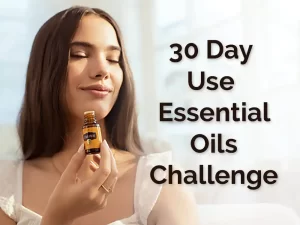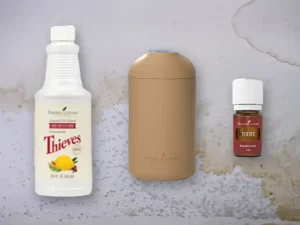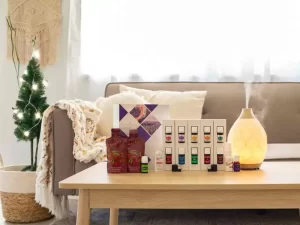Lately I have seen posts on social media concerned about sustainability when it comes to essential oils like Palo Santo and Frankincense. Which begs the question are essential oils sustainable?
Through sustainable practices, Young Living Essential Oils work hard to protect the soil, water, and air needed to produce pure essential oils and to ensure long-term ecological balance everywhere we do business.
Is Palo Santo Sustainable?
Palo Santo aka “Holy or Sacred Wood” essential oil was first made available to the world in 2005 by D. Gary Young, founder of Young Living.
The FASCINATING thing about this tree is that it must be fully mature, then die naturally (not cut down), fall over and lie on the ground for years before the essential oil is produced. No-one knows why this is, but no oil is produced from the tree otherwise. It was a TWO year project for Gary and his research team just learning how to get the oil out of the tree. Extraordinary oil!! Palo Santo essential oil is truly one of a kind!!
Gary Young’s Palo Santo essential oil is UNBELIEVABLE! This oil contains 60-80% d-limonene which is unheard of in a tree oil. In Ecuador it is AGAINST THE LAW to remove or cut down Palo Santo trees as they are protected. Additionally, even taking the dead trees has limitations and must be permitted through the government. So, there are VERY few companies that are permitted to even touch the trees, more or less produce the essential oil. Because of this, I am suspicious of 99% of the companies selling Bursera graveolens oil or Palo Santo Oil on the internet today.
Boasting nearly 2,000 lush acres of farmland, our Ecuador farm’s fertile ground and year-round growing season support an abundance of sustainable palo santo trees. By cultivating, harvesting, and distilling many of our essential oils on our very own farms, we have the unique ability to verify perfection at every step of our process.
Combine this with our extensive laboratory testing and independent audits, and it’s no wonder that we routinely exceed our own industry-leading quality standards. Our commitment to quality doesn’t stop there, however. Inspired by the fields, forests, and jungles that surround our pristine farms, Gary Young is constantly discovering new botanicals and essential oils, helping us bring more of nature’s greatest gifts to people everywhere.
I have previously posted a video I made after visiting the palo santo farm in Ecuador which talks about how Young Living is undertaking reforestation of palo santo and enduring other practices are followed so this valuable tree is around for future generations to enjoy.
Young Living has been leading the way in developing this global standard.
The Gold Standard is a class of excellence in essential oil production, and a commitment to ongoing improvement in both essential oil products and processes.
It is the ultimate benchmark within the essential oil industry – a benchmark which not only can be used to measure the performance and standard of any essential oil company; it will also encourage every essential oil company in the world to raise its standards, thus ensuring that our entire industry and millions of consumers benefit.
This standard doesn’t just look at the quality of essential oil production. It recognises that companies like Young Living have the opportunity to change the lives of communities around the world, by providing jobs and opportunities for those less fortunate.
Unfortunately some other essential oil companies strive for price differentiation through sourcing oils from farms where Fairtrade agreements are not in place, or where plants are not sustainably harvested.
In addition to the quality of essential oil production, the Gold Standard also requires that:
- Fairtrade agreements must be in place with suppliers (meaning that decent working conditions and fair wages are adhered to, for the empowerment of farmers and workers around the world)
- Plants are sourced sustainably, so that no plant is endangered through the production of essential oils
- Suppliers are correctly set up within their country of operation, and compliant with both local and USA laws.
The Vida de Seville Distillery is an example of sustainability

The Vida de Seville Distillery is located in Almaden de la Plata in Seville, Spain. The distillery’s stunning site sits on the edge of the Sierra Norte Nature Park, where the vicinity’s well-preserved nature offers pure, raw plant materials.
The Vida de Seville Distillery crafts Cistus, Frankincense, and Myrrh essential oils.
The workers use best practices to master the distillation process to help us keep up with the high demand for these essential oils.
Zero-waste practices – Vida de Seville Distillery uses a reprocessing system that incorporates filtering, drying, and recycling distillation biomass.
The local workers also go above and beyond to use sustainable methods as they handpick wildcrafted cistus in the Sierra Norte Nature Park.
We whole-heartedly believe in preserving nature and giving back to the community. The Vida de Seville Distillery promotes hiring local personnel living in Almaden de la Plata and uses practices to sustain the quality of the land.
Ensuring the future of Frankincense
What is Young Living doing to ensure the future sustainability of these amazing Frankincense trees?
Here is a great video made a few years ago where Gary Young himself explains what Young Living are doing.
Is Spikenard Essential Oil Sustainable?
Spikenard essential Oil used to be one of the essential oils sold in the Ancient Oils of Scripture Collection. Sadly it is no longer available through Young Living because of the issues in obtaining sufficient sustainable sources for Spikenard at the quality required by Young Living’s Seed to Seal process.
So if you are buying Spikenard from another essential oil company, it is very likely either synthetic, or illegally obtained. Make sure you do your due diligence.
Is Young Living Sustainable?
Often I’ll get messages from people concerned about whether Young Living uses palm oil?
Or how they source their micas in the mineral make up?
How the Candelilla wax in the lipsticks in harvested?
Why don’t Young Living sell rosewood or spikenard anymore?
Why are Young Living’s products so concentrated?
Are essential oils sustainable if they have to cut down the whole tree to produce them?
Well here are my answers to all your sustainability questions and more.

Even the fish oil in OmegaGize is Sustainable
OmegaGize is a foundational Young Living supplement – meaning everyone can benefit from it! DHA and EPA are omega-3 fatty acids and are a vital component to any wellbeing regimen. The sourced Omega-3 in OmegaGize is one of the purest fish oils available and is rigorously and independently tested to ensure that it is free of environmental pollutants. They are also certified ocean friendly and certified sustainable.










 Subscribe to Hot Oily Mumma
Subscribe to Hot Oily Mumma